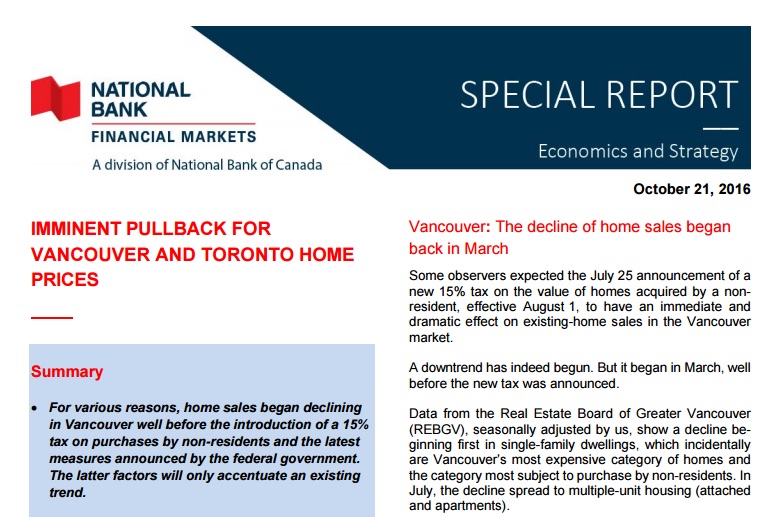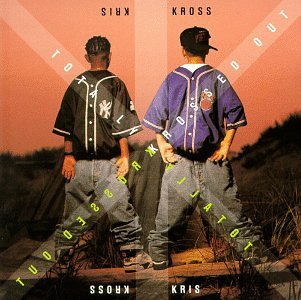Do the words “special report” have a special meaning to you?
I hear “special report,” and I have flashbacks to the 1980’s, with my after-school G.I. Joe cartoons being followed by news out of Buffalo; usually some local story about the high school football team’s bake-sale helping to fund-raise for much needed new uniforms!
In any event, National Bank released their “special report” on Friday, and it’s starting to make the rounds.
A 20% drop in Vancouver home prices is just the appetizer in this one…

Special Report, eh?
Well, it’s probably not that special when you consider that just about every lender out there is putting something similar together.
But the media has picked up on certain headlines and notes in the report, so let’s discuss a few of the bigger-ticket items today.
First, find the link HERE.
For those of you who don’t have the time, or the wherewithal to read the report, or even click on the link, let’s just look at the first half of the first page, for starters:

What stands out at you?
Maybe the ALL RED CAPS FONT?
“Imminent pullback for Vancouver and Toronto home prices,” all in red, can’t miss it.
That’s a headline, ain’t it?
Now I think it’s fair to say that the laymen and the masses are not reading this special report, when many of them don’t even read the newspaper, so I would think it’s also fair to say that not everybody reading this report takes the content as gospel, fact, and/or with certainty.
I mean, in 2012, we had “experts” predicting the Canadian real estate market would drop by ninety-percent! Remember this loon?
So let me go through the points of this report that I find the most interesting.
1) Vancouver sales began to decline back in March.
This is something that a lot of keen observers have been noting, and yet the media, and other parties with vested interests, have been directly attributing Vancouver’s “decline” to the 15% foreign buyer’s tax.
From the report:
A downtrend has indeed begun. But it began in March, well before the new tax was announced. Data from the Real Estate Board of Greater Vancouver (REBGV), seasonally adjusted by us, show a decline beginning first in single-family dwellings, which incidentally are Vancouver’s most expensive category of homes and the category most subject to purchase by non-residents. In July, the decline spread to multiple-unit housing (attached and apartments).
There are several plausible explanations for this trend. The Teranet–National Bank House Price IndexTM reports that Vancouver-area home prices – already the highest in the country – took off in February, rising an average 2.5% monthly through August (chart 3). That could have put prices out of reach for some potential buyers. Also in February, the minimum down payment for new insured mortgage loans was raised to 10% from 5% for the portion of the price exceeding $500,000, a threshold often exceeded in Vancouver. Again in February, the B.C. government introduced a 3% tax on the value of homes sold for more than $2 million. And finally, China’s anti-corruption campaign is suspected of crimping the flow of capital from that country.
–
2) Toronto prices are insane
Here’s a fun stat that the report gives us:
Over the last four months, as chart 3 illustrates, Toronto home prices have risen an average 2.9% monthly. The Toronto market is now red hot.
Monthly.
That’s right – monthly!
Prices are up 2.9%……..monthly!
That’s, per month, for those of you that didn’t know.
–
3) And yet prices will drop?
Here’s something that completely contradicts the above:
Prices are likely to drop less than in Vancouver. We expect a 3% decline in 2017.
–
4) And yet it could always be worse…
The report also gives us:
We think Vancouver home prices will soon start correcting. We expect a decline over 12 months of 10% overall and 20% for detached homes.
A decline of 20% for detached homes…….in one year?!
That’s a bold prediction.
But maybe it’s not quite as bold as we think.
What goes up, must come down. Right?
So if the average price of a home can increase 20% in a year – or closer to 30%, as is the case with some segments of the Vancouver market, then perhaps a 20% drop is possible?
Theoretically, yes. But in practice, I think the prediction is nuts.
Not quite as nuts as Hillard MacBeth’s 2014 prediction of a 40-50% drop, however…
5) Condos are better than houses
Right after the report offers a prediction of a 20% drop in value for Vancouver detached homes, it predicts that condos will decline 5%.
Wait…..is it backwards day?
Are my pants facing the right way?
I feel like it’s 1991, and I’m buying a cassette tape from Edward’s Record World…

Look, this should come as no surprise to the hundreds of people I have sold condos to – but detached houses are, and always will, be a better product than condos. I have said this time and time again, and I start many conversations with first-time buyers by saying, “If you can afford a house, and you’re not working 80-hours a week downtown and married to the condo lifestyle, then buy a house.”
So to see this report predict that houses, and not just houses, but detached houses, which are the holy grail of houses, will drop in value four times over the drop in condominium units, well, I just think that’s wiggity-wiggity-whack, and it makes me wanna jump, jump.
–
Big news coming from CMHC at 12:00pm on Wednesday.
My prediction: they’re going to announce that they will no longer bulk-insure conventional mortgages.
Stay tuned!































Gautam
at 9:07 am
All this, of course, is just my opinion.
They could turn out to be correct (not due to reasons stated in the report) as affordability for detached houses might come down more significantly than condos due to:
1) tighter mortgage rules- lesser people qualifying for higher priced houses and being able to qualify only for condos
2) foreigners’ tax (this is true for Vancouver)- yes, it is not the holy grail everyone is making it out to be but it does have an impact on the highest end of the market, which invariably pulls the average number up. And who know- a vacancy tax might be in the works too.
3) general caution (this is true more for Toronto)- market timing doesn’t always work for first-time homebuyers but when the government seems to be focusing its attention on the housing market, many people want to wait and watch and see what happens in the next 4-6 months i.e. “What if this is the inflection point?”. The people who are thinking like this are first time homebuyers who have the means to buy a house with >20% downpayment. This is purely anecdotal but at least a dozen people I know are thinking like this. They think that the sellers are just humans like the buyers and the people sitting on “goldmines” will want to cash out at a slightly lower prices (and progressively lower prices over time) if they see their “goldmines” getting depreciated. No one panics more at the idea of losing wealth who doesn’t know how to re-earn it.
Kyle
at 9:21 am
While i don’t agree with the report’s conclusions i would say this is still a worthwhile read, it raises some valid headwinds and offers evidence that actually supports their hypothesis. Unlike all other bearish prognosticators whose entire hypotheses amount to nothing more than crossed-fingers and the hopes some magical affordability fairy is going to wave her wand and restore some mystical historic relationship that bring detached homes in large cities back in to the price range of the average joe.
Mike
at 11:23 am
Exactly.
The difference between the NFB and what David is saying is that NFB is backing up hard numbers rather than just stating an unsubstantiated opinion.
National Bank is also in the business of writing loans. Saying that there is going to be a pull back in Canada’s two largest markets doesn’t help them sell more mortgages, in fact it hinders their own stock price. They don’t have anything to gain from saying there is going to be a pullback.
Single-family homes (SD’s) in Greater Toronto average what, $800,000, as opposed to the Vancouver area which was around $1.4 million before the tax. It stands to reason that more people can afford condos rather than SFD’s. Not sure if David has been to Vancouver but geography has limited development in the city for a long time. It got so bad that office buildings were being converted to condo’s until the city put a stop to that. It’s not like Toronto with over a hundred cranes building new supply, supply is as tight as it can get. So you have a majority of people who can only afford condo’s, a limited supply of of condo’s, guess what’s happening to demand? That’s right, demand for condo’s won’t drop the same way SFD will. SFD’s will drop until more people can afford them. Honestly, I don’t think the report could have made it any more obvious.
jeff316
at 9:57 am
I thought the report was pretty good. I can’t argue with it, and I agree that David’s condo thoughts are reactionary and based on assumptions that don’t hold in Vancouver. National Bank, however, does have an interest in projecting house price reductions. Their business is much more than writing loans and it would help their reputation as an astute analytical organization in the banking market, for both commercial and residential clients. Particularly in this market, where everyone without a house has been screaming correction for years.
Mike
at 11:37 am
Jeff,
I’m not sure how it would help their clients to say that housing prices are coming off their highs. National Bank doesn’t sell it’s research. Their institutional desk isn’t known for making a market in credit default swaps, besides, the market for that is tiny compared to the mortgage market.
National bank has gone on record saying they are curbing their mortgage business in Toronto and Vancouver long before this report ever came out. I don’t see how that helps out their commercial and residential clients; could you expand on your thoughts?
Joel
at 12:24 pm
As a purely anecdotal observation of the Toronto market: My wife and I looked at an open house a few houses down from our house this weekend. It was listed for $100,000 more than we bought our house for 2 years ago. This house was on a smaller lot and not as recently renovated.
There were over 20 couples looking at the house while we were there. With that amount of pent up demand it would be hard for me to believe that we are going to see a 3% price decrease.
Kramer
at 3:42 pm
I have another mere observation for what it is worth.
A smallish detached house with some good characteristics (good parking, good TTC access, got an exterior facelift but not interior) near Woodbine and Danforth was listed for $799,000 this weekend. It had 8 OFFERS and went for $967K.
My only point here is that even for a $1MM and what I would say completely NON-luxury house there is HUGE HUGE HUGE demand.
It just feels that there would need to be a very big ‘event’ to knock this demand off it’s track or shoot up supply.
Some say Toronto is just “catching up” to where it should be. If that many people are in the market for $1MM non-luxury homes maybe this is true. Buyers are willing and apparently able, even with the new stress tests.
Kramer
at 3:48 pm
Also for what it’s worth, the people who I know who bid on it are a family looking for a house to live in. They are not speculators. They want to buy a HOUSE to LIVE IN and raise their kids. They are not motivated by potential huge gains on the house value… of course they would be OK with that as having it go down in value is no good, but… they are motivated by needing a house to spend their lives in. THIS is the face of the demand for houses in this city. That is a STRONG kind of demand.
Again, just anecdotal but, it is important to stop and consider.
Kyle
at 4:23 pm
Agree totally with both of Joel’s and Kramer’s observations. There continues to be huge (and growing) pent up demand. I saw a house that needs $600K+ in renovations listed at $2.2 MM selling for $400K over this month. Exclusive listings used to always expire and end up on mls, i’m actually seeing them sell before going to mls now. I’m even seeing many of the unsellables (i.e. those houses that have been listed on mls for several years) selling.
Across the GTA the days on market (DOM) keep shrinking, looking at the latest TREB report, in all of the GTA only 1 area (Essa) had a YTD Avg DOM greater than 30 days. In the 416 area code the YTD Avg DOM’s tends to be under 20 days.
Appraiser
at 2:03 pm
Speaking of predictions, CMHC has a different view than National Bank. CMHC soothsayers see rising prices in Canada over the next 2 years.
http://www.cbc.ca/news/business/cmhc-housing-market-analysis-1.3822175
Mike
at 3:01 pm
The difference is that your CBC article is talking about prices rising across the whole, whereas the NBF report talks specifically about Toronto and Vancouver, two cities that the CMHC report identifies as being “red flagged” because they’re over valued.
They just released their market outlook for Toronto and as sumarised in the article you referenced, prices are expect to continue to grow but say that growth is tapering off and describe it as moderate. https://www.cmhc-schl.gc.ca/odpub/esub/64319/64319_2016_B02.pdf?fr=1477507344385
They spend the bulk of their outlook talking about how the Toronto market is overvalued. So I guess you’re okay as long as you plan on selling your house or condo in next two years. That said, if you’re buying now and NBF and CMCH are correct and you need to sell in the 5-8 years, you might have trouble recouping your LTT and RE commissions.
Real estate millennial
at 7:10 pm
David your segment on bnn a couple days ago was good you’re more objective and better articulated than Al Sinclair. I believe that a lot of people are looking at the housing sector from a micro and not a macro perspective. The finance minister is looking at Canada wholisitcally and our economy as a whole is brutal and the only thing that has caused the real estate sector in Toronto to slow was a recession. We’re nearing recession again as our economy isn’t growing and nearing a stall. With massive job loss usually taking place in a recession and Canadians holding such large amounts of debt it would only make matter worse with high housing prices. All this leads to my point that the government is dead set on slowing housing prices because I believe that they see a recession as certain fact coming fairly quickly. In a market free of government intervention I believe prices would continue to increase steadily instead of starting to slow and tapper off.
Kramer
at 9:45 am
1. Al Sinclair has been right so far, in the face of armies of doomsday predictors.
2. Al Sinclair openly says that significant increases in interest rates WILL (not might, WILL) hurt the market and cause a levelling or correction vs what we see now. Personally, after frigging hundreds of hours of reading on this subject over the last few years, I can’t think of anything else that would cause a stall or fall either (aside from surprises, like government intervention) .
3. In late December, Al Sinclair called for a 2.5% increase in house prices in the GTA in 2016. HE MISSED TO THE DOWNSIDE BIG TIME, yah, Al Sinclair’s estimate turned out to be ultra conservative.
With all that in mind, I don’t see why he is so bash-worthy. And remember, he is a real estate agent… not a Certified Financial Planner or your portfolio manager or an economist or the Research Director at an investment bank. Take him and his advice for what it is. It’s a pulse on the market.
Libertarian
at 12:34 pm
“In a market free of government intervention I believe prices would continue to increase steadily instead of starting to slow and tapper off.”
I would argue that what Morneau did the other week is undo government intervention, not increase it. The existence of CMHC is government intervention. Without it, most people wouldn’t get mortgages from the banks at such low rates. Without huge mortgages, people couldn’t get into bidding wars where there are second and third and fourth rounds where people keeping raising their bid. Without pre-approvals of huge mortgages, there is less demand, etc., etc.
We all know the other forms of government intervention that were tried and pulled back: 40 year amortizations, 0 down, etc.
We either have government intervention or we don’t. As the old saying goes, you can’t be half pregnant. So the government realized that having the taxpayer backing the entire real estate industry was not a good idea, and it is working to rectify that problem.
Mike
at 1:32 pm
I’d agree that the market is where its at because of government intervention. Low rates, ease of capital and a fear that it will one-day be taken away, have created an unnatural demand.
Joel
at 9:34 am
For anyone interested: http://www.bnn.ca/real-estate/video/a-look-behind-the-sales-tricks-of-the-real-estate-industry~978714
Milan Adam
at 1:50 pm
You make some interesting points- but I have to say that I really believe alot of the hesitation in Vancouver is in fact due to the foreign buyer’s tax- why would they want to pay the extra 15% vs. buying elsewhere?? But at the same time, the B.C. government didn’t have much of a choice, seeing as the majority of Canadians couldn’t afford even a beginner home within the city (or its suburbs).
With regards to Toronto, I have noticed a lot of big names leaving the city and selling their houses. Now whether that is an indication of some radical change to come from the powers that be (much like rats leaving a sinking ship), I’m not sure- but seeing as it’s the second highest city in terms of real estate in Canada, I think it is safe to assume that there will be some repercussion of the Vancouver bylaw that is felt here at home.
frank
at 9:28 pm
Stumbled across this blog when searching for Toronto real estate stats. I’m a Realtor in Vancouver. As of the end of November detached prices are down 15% here. In some areas, such as Surrey they are down as much as 20%! Never say never I guess.